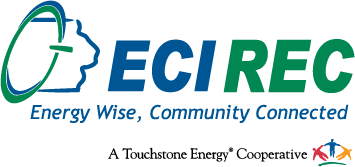CIPCO: Our Partner in Power
ECI REC receives much of the power it provides to members from Central Iowa Power Cooperative (CIPCO). Headquartered in Cedar Rapids, CIPCO is a generation and transmission cooperative serving 13 rural electric cooperatives and associations in the state of Iowa. CIPCO's service territory stretches 300 miles diagonally across the state. CIPCO and its member cooperatives provide electrical service to nearly 320,000 rural and urban residents and approximately 12,000 commercial and industrial accounts in Iowa.
CIPCO's board of directors is made up of one representative from each of its member cooperatives.
Being a member of CIPCO offers ECI REC numerous benefits, including training sessions for our employees and analysis of energy needs. They also purchase renewable energy, allowing us to offer a balanced energy supply to our member-consumers.
The National Rural Electric Cooperative Association
The National Rural Electric Cooperative Association (NRECA) is the national service organization dedicated to representing the national interests of cooperative electric utilities and the consumers they serve. NRECA is an advocate for consumer-owned cooperatives on energy and operational issues as well as rural community and economic development. The association has more than 900 member cooperatives that serve 42 million people in 47 states.
The Iowa Association of Electric Cooperatives
The Iowa Association of Electric Cooperatives (IAEC) is the Des Moines-based service organization representing the state's rural electric cooperatives. The association represents 34 distribution cooperatives in Iowa and six generation and transmission cooperatives providing electricity to approximately 650,000 Iowans in each of the state's 99 counties.
IAEC performs many vital functions for its members, including: legislative representation at the state and national levels; safety programs; communication resources; youth programs; and a statewide disaster plan to help restore power quickly and safely during emergencies.
National Information Solutions Cooperative
The National Information Solutions Cooperative (NISC) is an information technology company that develops and supports software and hardware solutions for utility cooperatives and telecommunications companies. NISC is an industry leader providing advanced, integrated IT solutions for consumer and subscriber billing, accounting, engineering, and operations, as well as many other leading-edge IT solutions.
National Rural Utilities Cooperative Finance Corporation
Formed in 1969, the National Rural Utilities Cooperative Finance Corporation (CFC) is a privately owned, non-governmental organization that provides state-of-the-art financial products to its members. CFC is the premier private-market lender for the nation's electric cooperatives -- an independent source of financing that supplements the credit programs of the U.S. Department of Agriculture's Rural Utilities Service (RUS). CFC also provides financing and management expertise to non-RUS borrowers.
Cooperative Response Center, Inc.
Founded in 1992 Cooperative Response Center, Inc. (CRC) provides a 24/7 professional (call) contact center for customer care and crew dispatch services. CRC's Energy Dispatch Services combine customer care and crew dispatch for electric utilities.
Experienced and professional customer service representatives are capable of answering consumer phone calls in high volume with little or no occurrence of busy signals during outages. This satisfies customers and pinpoints outage locations more quickly. CRC's dispatchers communicate with your utility's crews on after-hours outages from start to finish.
Rural Electric Supply Cooperative
The Rural Electric Supply Cooperative (RESCO) is a purchasing cooperative own by 179 electric cooperatives and municipal utilities in Iowa, North Dakota, South Dakota, Minnesota, Wisconsin, and Michigan. It is headquartered in Madison, Wisconsin, and has warehouses in Ankeny, Iowa; Fargo, North Dakota; Madison, Wisconsin; and Mt. Pleasant, Michigan. ECI purchases most of the material it uses to build and maintain its distribution system from this organization.
